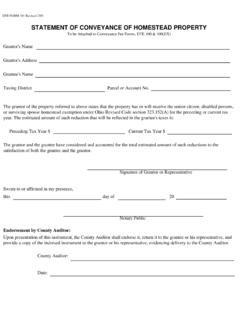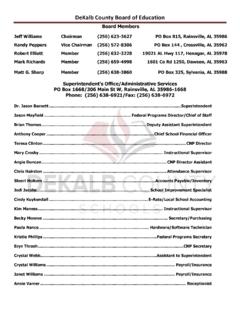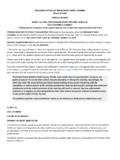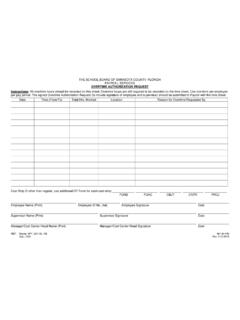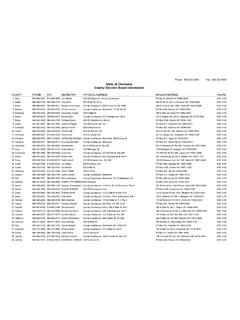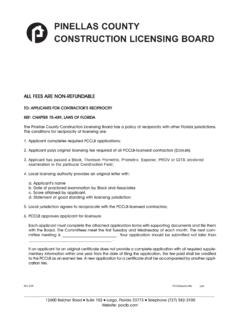Transcription of Robert A. Goering Rules of Practice & Procedure Hamilton ...
1 1. Rules The following Rules are promulgated in accordance with Chapter 5715 and Section (B)(1) of the Ohio Revised Code. 2. Organization (A) The Board of Revision shall herein be referred to as the Board . The office of the Board shall be at 138 East Court Street, Room 304, County Administration Building, Cincinnati, Ohio 45202 and shall be open every day from eight to four , Saturday, Sundays and legal holidays excepted. (B) The Board shall consist of the Auditor, Treasurer, and a member of the Board of County Commissioners selected by the Board of County Commissioners or their statutorily appointed designee. (C) The Board shall be in continuous session and open for the transaction of business during the business hours herein provided. All sessions shall be open to the public and sessions of the Board shall stand and be adjourned without further notice thereof on its records. (D) All proceedings and documents concerning your hearing are public record and may be copied, electronically transferred or displayed on the Auditor s website.
2 (E) Each member s vote shall be recorded on the record as cast. 3. Service (A) All pleadings, briefs, papers and other documents filed by a complainant with the Board, subsequent to the filing of the complaint, shall be served upon all parties. (B) Said pleadings, briefs, papers and other documents shall contain a certificate of service indicating that the required service has been made, the manner in which service was made, and the names and addresses of the parties or attorneys upon whom service was made. (C) Service upon an attorney or party shall be made by delivering or mailing a copy to the attorney s or the party s last known address. Service by mail is complete upon mailing. 4. Copies Any document that is filed with the Board shall be filed as one (1) copy on letter size (8 x 11 ) paper in a manner which is not permanently bound ( no staples or binders). Materials should be paper-clipped, rubber banded or enveloped.
3 5. Appearance And Practice Before The Board (A) Following the holdings of the Board of Tax Appeals, attorneys at law and owners of record of affected properties are permitted to file complaints for a reduction in value. In other situations, consult your attorney. Our employees are prohibited from dispensing legal advice. (B) Persons authorized to Practice law in jurisdictions other than Ohio may be permitted, upon presenting proper documentation to the Board, to Practice before the Board in a particular proceeding. (C) Attorneys representing parties will not be permitted to testify or appear in any capacity other than as counsel. (D) If the complainant is unable to attend his/her hearing, a person holding the complainant s power of attorney or a person not holding a power of attorney may appear as a witness to provide evidence about the property. The witness should provide to the Board written authorization from the complainant briefly describing the witness s relationship to the complainant and his/her knowledge of the property and signed and dated by the complainant.
4 6. Complaints-Filings (A) The complaint filing period is January 1 through March 31. A United States Postal Service postmark of March 31 is sufficient. Complaints filed after the March 31 deadline will be dismissed by the Board. The complaint (DTE Form 1) should be filled out in its entirety and signed; failure to do so may result in a dismissal. THE BURDEN OF PROOF IS ON THE COMPLAINANT. Any complainant shall file with the complaint or at a time not later than ten working days before the date of scheduled hearings the following information: (1) For complaints on Residential Property the following information should be submitted for review by the Board of Revision. This information may be useful to the Board in determining whether an adjustment to the property value is warranted. a. Closing statements, purchase contract, and a copy of the conveyance statement, if applicable. b. An Appraisal Report that reflects the value as of the relevant tax lien date (please see the Guide To Presenting Your Case to learn the relevant tax lien date for this filing season) if such is intended to be offered as evidence.
5 Please note that an Appraisal Report, if submitted, is subject to review by an appraiser from the Auditor s staff who will then advise the Board if he or she is in agreement with the Appraisal Report. The Board will then weigh all evidence and establish a value. c. Certified estimates from a contractor for repairs cited on the complaint. Major structural issues may affect the value of the property while regular maintenance needs (new roof, new driveway) are typically factored into the existing current value based on the age/condition of the property. d. Any other supporting documents. (2) For complaints on Commercial/Industrial Property the following information should be submitted: a. Closing statement, purchase contract and a copy of the conveyance statement, if applicable. b. Lease agreements and/or rent rolls, if applicable. c. Photographs, Income and Expense Statements or appropriate schedules of the complainant s Federal Income Tax Return.
6 D. Construction cost of new building, if applicable (certified by the builder). These should include both hard and soft costs. e. An Appraisal Report that reflects the value as of the relevant tax lien date (please see the Guide To Presenting Your Case to learn the relevant tax lien date for this filing season) if such is intended to be offered as evidence. f. Certified estimates from a contractor for repairs cited on the complaint. g. Any other supporting documents. Hamilton County Board of Revision Rules of Practice & Procedure Greg Hartmann Hamilton County Commissioner Robert A. Goering Hamilton County Treasurer Dusty Rhodes Hamilton County Auditor (3) Only one complaint per parcel may be filed in one triennial period unless the complainant alleges that one of the exceptions on Line 14 of DTE Form 1 applies, or unless an exception outlined in applies. (4) If the complainant bases his complaint on a Market Data Analysis, all comparable sales conveyance statements evidencing such sales should be presented in addition to any reports, documents, exhibits or other evidence of any kind intended to be produced at the hearing.
7 (B) Failure to produce documentation in the manner required by Rule 5(A) may result in materials being held inadmissible by the Board. 7. Preliminary Motions (A) Any preliminary motion made by a party shall be presented to the Board at least ten days before the scheduled hearing. (B) The Board may refer motions to its statutory counsel (the Hamilton County Prosecutor) for his opinion on the merits. 8. Hearings (A) The Board s secretary will schedule each complaint for a hearing and written notice thereof shall be given to the parties or their representatives of the time and place of the hearing. In rare circumstances, for good cause shown, the Board may continue hearings at a party s request. Requests for continuances should be directed to the Board by calling within seven calendar days of receipt of the notice of the scheduled hearing. (B) By law, Hearing Notices that provide the date of the complaint hearing, and Final Notices that provide the results of the hearing are sent to parties by certified mail.
8 It is the complainant s responsibility to pick up certified mail when notice is received from the Postal Service. (C) All hearings shall be open to the public and shall be recorded. (D) Complainants filing on their residential properties should plan on a hearing that lasts ten to fifteen minutes. (E) Each commercial case will be scheduled for an amount of time in line with its relative complexity. This determination will be made based on material submitted to the Board in advance. PLEASE NOTE: Parties will benefit from providing information and proposed exhibits when filing their complaints or as soon thereafter as possible, so that an appropriate amount of time may be scheduled for their hearing. (F) The Board of Revision reserves the right to maintain control of the length of each hearing and to limit extraneous commentary. This helps to assure that complainants scheduled throughout the day are not kept waiting. (G) The Board of Revision reserves the right to maintain proper decorum in the hearing room.
9 9. Order Of Hearing (A) The complainant shall present his evidence, which may include witnesses testifying on the complainant s behalf, first. Any counter complainant shall proceed next. The Auditor s office will be represented by a qualified witness who shall testify last unless the choice is made by the Auditor not to present testimony. (B) The Board or its counsel may interrupt or examine the parties and their witnesses at any time. (C) Limited cross examination will be permitted between parties at the Board s discretion. All questions and comments will be addressed to the Board s chairman. 10. Evidence The Board need not consider any document or exhibit not specifically enumerated in these Rules and which is offered for purposes of the hearing and has been prepared by a person not present at the hearing and capable of being cross-examined by the Board. 11. Continuance In Progress By The Board The Board may continue a hearing in progress for the purpose of additional investigation of disputed matters or the purpose of taking matters under advisement for opinions from statutory counsel.
10 12. Briefs (A) At any time prior to the issuance of a final decision and order on a complaint, the Board may require briefs from the parties. Briefs shall be filed within the time limits set by the Board. If any party fails to submit a brief within the time limit, the Board may exclude the brief from its consideration. (B) One complete and accurately conformed copy of each brief shall be filed with the signed original. 13. Voluntary Withdrawal The complainant may voluntarily withdraw a complaint by filing a written notice of withdrawal at any time before the commencement of testimony. However, a voluntary withdrawal of an original complaint shall not affect the validity of a timely filed counter-complaint. 14. Decisions All decisions by the Board will be made on the record at a public hearing. Copies of said decisions will be mailed to all parties by certified mail. 15. Documents Pursuant to Revised Code Section , all documents of any kind presented to the Board of Revision shall be open to public inspection.
